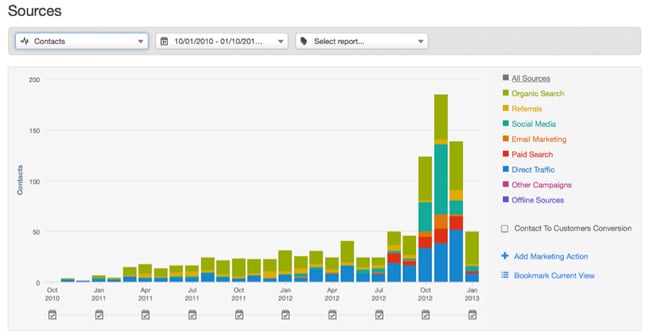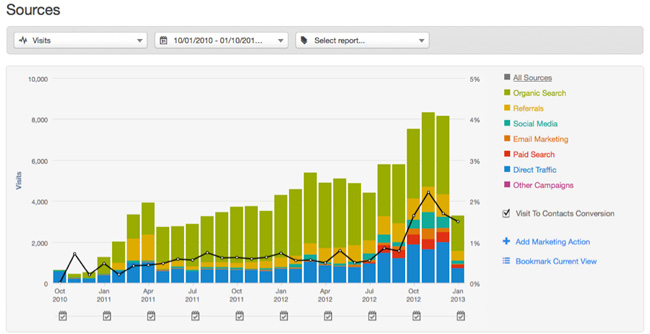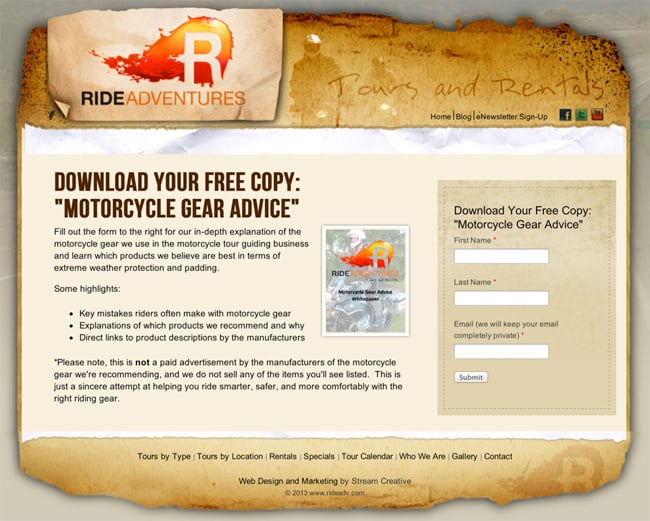Marketing Challenge
RIDE Adventures is in a unique type of travel business with a dependency on keywords that have relatively low search volume. (For example: “Motorcycle Tours”) In an initiative to increase Top of the Funnel (TOFU) leads through their website, Eric Lange, the owner of RIDE Adventures recognized they would have to gain new visits and contacts through keywords and topics that are more widely searched for by their prospective customers. After thorough keyword research and analysis, he confirmed that not only were keywords like “Motorcycle Gear” and “Motorcycle Travel” pertinent to their customers’ interests, but they also had remarkably higher search volume than keywords directly focused on what RIDE Adventures was selling.
The Solution
As RIDE Adventures had already been committed to creating resourceful content in blogging and videos, similar topics were also formed into downloadable whitepapers, free for visitors and researchers to enjoy. In some cases these whitepapers already existed, as they were being provided to customers upon bookings for motorcycle tours anyway. The difference in late 2012 was that instead of these whitepapers only being offered to existing customers, they were placed as calls to action (CTAs) throughout the website, as well as built into a specific page dedicated to “Free Motorcycle Travel Information.” More content, more keywords, and more offers have led not only to an increase in visits to their website, but an amazing spike in TOFU contacts is being enjoyed as well. (Screenshots taken January 10, 2013)

An important point to make note of (shown in the next screenshot below) is how the previous couple of years of blogging and creating content had definitely increased traffic to the web site, but TOFU leads were not increasing at the same rate. As we’re constantly reminded, “content is king,” and especially helpful if your company’s ideal keywords also have high search volume. However, in the event there isn’t high search volume for your ideal keywords, creating pertinent content on “secondary” topics related to what we’re selling is what’s needed in order see such a spike in TOFU leads.

In addition to creating the whitepaper download offers themselves, each click by a visitor was leading them to very specific landing pages made in accordance with Hubspot’s 10 Best Practices For Landing Page development. Whereas many of these best practices had previously been overlooked or ignored by RIDE Adventures, implementation of such key features into these new pages has seen conversion rates as high as 34% as compared to their more antiquated landing pages, which tend to average around 10% conversion rates. The combination of a great offer found through pertinent keywords and a well-designed landing page is proving quite fruitful to RIDE Adventures.
This strategy helps RIDE Adventures not only in gaining more contacts, but also in terms of credibility and content as well. TOFU leads that receive these whitepapers are benefitting from the vast information provided and often coming back for a 2nd, 3rd, or 4thdownload later. Stream Creative had been consulting with RIDE Adventures and reminding them of the importance of being seen as authority on the topics their customers are interested in. As a result, customers keep coming back for more, which sets up the groundwork for workflows to be created that drive more leads to become actual customers.

It goes without saying that all the content, all the keywords, meta tags, and inbound links that stem from these new offers are contributing to the RIDE Adventures search engine rankings as well. In fact, the content provided in each whitepaper has been offered in short segments on their blog as well and helps the search engines discover each page and therefore each call to action leading them to a landing page.
The Results
Well, you can see them! Not only have unique visits continued to increase for RIDE Adventures, but in the final 3 months of 2012, their contact database actually doubled over what they had accumulated the previous 24 months of being in business. In addition: a) unique visits are reaching all-time highs and at steeper rates than what were typically realized, b) customers are seeing RIDE Adventures as an authority on a subject they’re interested in, and c) inquiries about the actual services RIDE Adventures is in business to provide have risen dramatically as well! Their outlook for 2013 as the 3rd year in business is looking brighter than ever before, and customers are feeling it as well.
About the Author: Steve James is a partner and creative director of Stream Creative, a certified HubSpot partner and full service digital marketing and design firm specializing in inbound marketing, web design and development, and social media.
